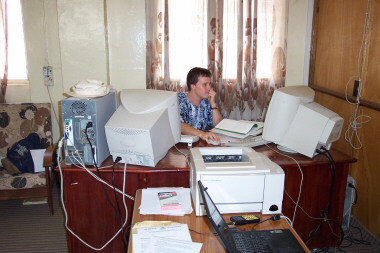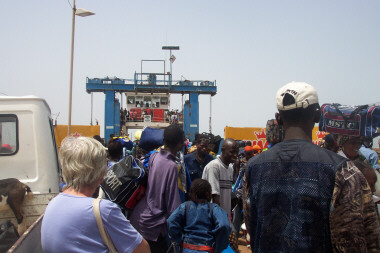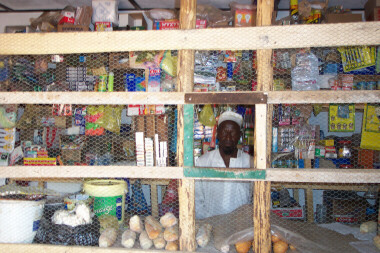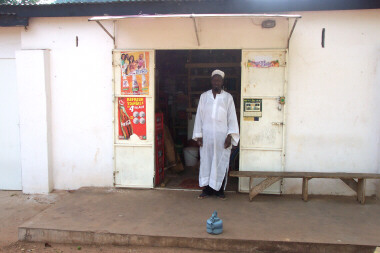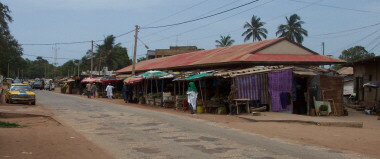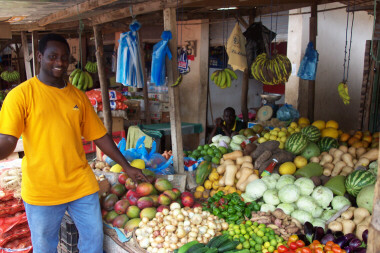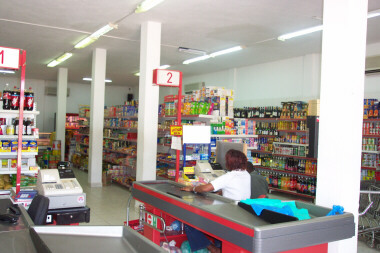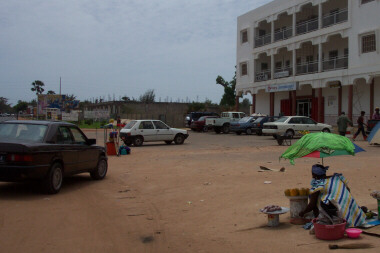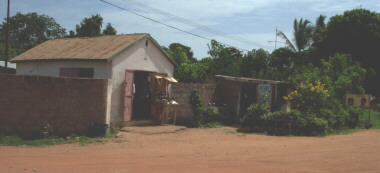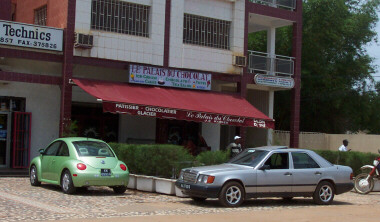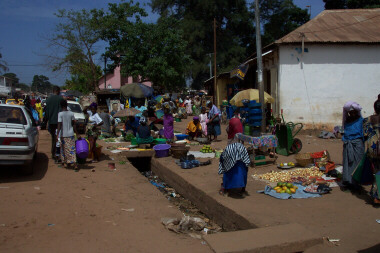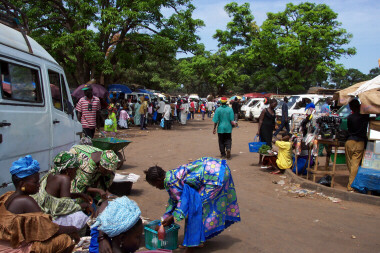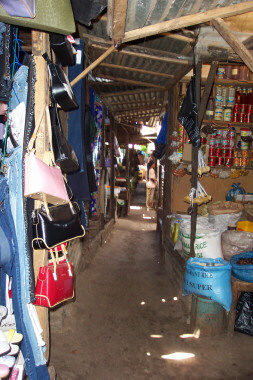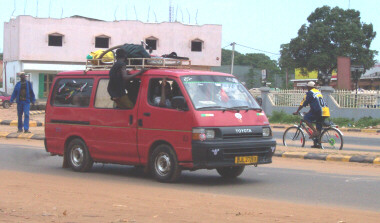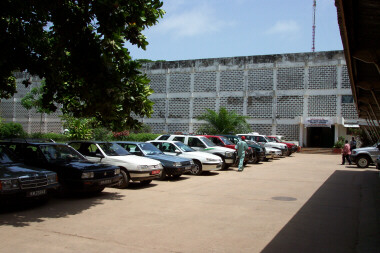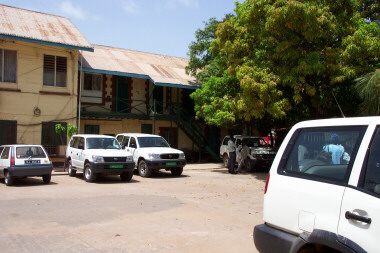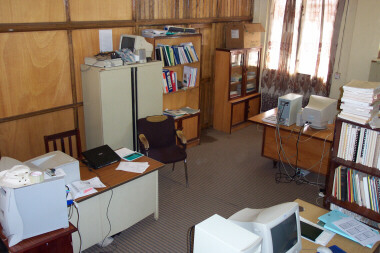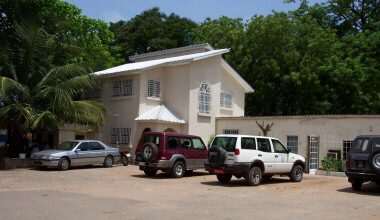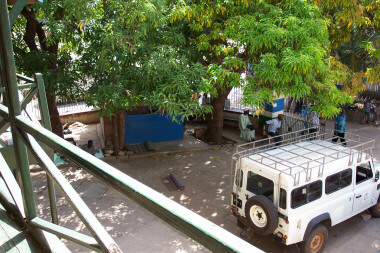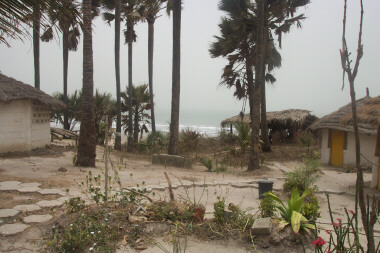VSO Gambia Journal - Postscripts
Day One Hundred and Fifty One - Tuesday, June 25th, 2002 - Kanifing
Another typical day here in the Gambia. It is beginning to get very warm now. Well, it seems that way. The temperature is about the same as a few months ago but it is now very humid since we are just getting into the rainy season. We have only had a few days where it has rained so far but I am told to expect a LOT more. Makes me wonder how often I should water the plants…
I begin each day getting up (without the alarm – I have not needed to use an alarm in years – only when I am getting up at a REALLY odd hour) at about seven. The sun is just beginning to rise about that time and since the window in my room faces the east I can't really sleep too much later – even when I want to. The curtains I had made do seem to help but a lot of light still gets in.
I immediately get into the shower to wash off the sweat of the night. Sleeping is quite a chore right now as it is so hot even at night that I have had the fan (standard VSO household issue) on just about every night – trying its best to push air through the mosquito net. The net is a bit of a pain, I make sure it is up every morning before I leave so that the bed linen at least gets a chance to air out. I don't know how many times I have accidentally pulled a bit too hard and had one or more corners attached to the ceiling come down on my head. It is only secured to the ceiling with cloth ties around a few nails.
The shower is always cold in the morning not like when I get home from work where it is a lot warmer – though not hot like it is up- country in places like Bansang where the water straight from the mains is too hot to risk putting your body under.
I visited Bansang as part of a trip in March where I was taken around the whole country – visiting all of the various divisions. This was essentially to introduce me to all of the various “DHTs” (Divisional Health Teams) but we also did a bit of work…We took a week staying for a few nights in Bansang then visited Basse – the furthest east we got – then returned through Bansang to stay for a night at Mansa Konko then we crossed across the river using the ferry at Mansa Konko to visit Farafenni then continued along the north bank to Kerewan for the night. The final day we visited Essau which is on the far west coast of the north bank just before you get to Barra – where we crossed to the south again via the Barra-Banjul ferry.
The Banjul-Barra Ferry
The ferry between Banjul (on the south) and Barra (on the north) is a very interesting experience. There is both foot and vehicle traffic on the ferry with no real schedule other than the first ferry that leaves from the Banjul side in the morning. The ferries do NOT operate at night and I say “ferries” but actually there is only one working at the current time and that ferry only has two out of the four engines working which is a bit of a challenge in the mouth of the Gambia river where it has to cross. There is also a bit of a challenge with the silt build up that is a problem around the Barra terminal. One of the times we left Barra the ferry took a good ten minutes of shifting back and forth to free itself from the silt on the bottom before we could continue to the opposite side.
Of course, if you do not want to wait for the ferry (which, no one will really blame you, since truck drivers have been known to wait for many days and even on the best of times you can expect to wait anywhere between 1 and 4 hours for the next ferry to arrive) you can take a pirouge though it might be wise not to. Pirouges are long thin boats – much like a big canoe – typically powered by a small engine at the rear. Pirouges are used for fishing but here they ferry people between Barra and Banjul though they tend to be VERY overcrowded. To get on a pirouge you have to either wade out into the water to climb aboard or you have someone carry you on their shoulders to the waiting boat (no joke – 1 D). Earlier in the year there was a serious accident where a pirouge overturned in the middle of the crossing and a number of people died (Gambians are notoriously bad swimmers) so now all of the pirouges have had life-jackets donated by a group from Europe though, those of us cynics, are wondering how long it will be before you see the life-jackets for sale in the markets…
The crossing tends to take about an hour and the water is a bit choppy as well. The ferry tends to also be as crowded as the pirogues with people jammed in amongst the vehicles which are also jammed in, often with less than four inches between the vehicle sides (with people inside their cars during the crossing!). People also stand all along the walkway above the ferry floor and sit in the few seats available on the first (second) floor. You tend to also be accosted by people selling all manner of things as well (chickens, cookies, baobab juice – my favourite, etc.).
The trip up-country was truly incredible – seeing a great deal of the country and the people. I made sure to take lots of pictures which were very well received since at work (I work for the Department of State for Health and Social Welfare) actually have very few pictures of the conditions and people around the country. I was also very happy to see how people lived in the other parts of the country and eating at places they would eat as well. In Mansa Konko we were also without electricity and water was not available after about 9 at night to about 8 in the morning. A bit of a challenge.
As soon as you leave the west coast, the Kombos area, where I live there are very few towns and what towns do exist are mostly quite basic with many not having electricity and/or water. Here in the Gambia this could be one of any number of reasons: 1) they have never had it installed or (more likely) 2) it is installed but the utility company (NAWEC) is unable to supply it. NAWEC is a bit of a joke here as many people wonder why they pay for service when it is out every few days (especially recently here in Banjul and Kanifing). Water is pretty consistent but electricity really seems to be a problem. It is provided by generators located around the country which are gas run. There have been many rumours about why recently the power goes out so often: 1) they have run out of fuel or (perhaps more cynically) 2) the World Cup of football is on TV and the people running the generators have been distracted while they watch the matches. I remember on May day watching NAWEC parade into the Independence Stadium and getting a round of boos from the crowd.
The houses up country tend to be a lot more basic as well with basic corrugated roofs until you get farther up-country where the huts are commonly mud with grass roofs.
Roads
The roads. Oh dear. Let me tell you about the roads…They are not a pretty sight. Most of the roads in the country are riddled with potholes that make any journey quite a challenge with the driver trying to avoid seriously damaging the vehicle quite often by simply leaving the road (the bush is not as bad as the road – believe me). There is a particular stretch of road between Farafenni and Kerewan where there is no attempt even at tarmac with the road basically following the stream bed from the rainy season – about 3 feet deep running through the middle of where there is, supposedly, a road. Our driver gave up on this road and simply drove through the bushes beside the road at the wonderful speed of about 20 km/hr. Took us quite some time to travel the short distance between Farafenni and Kerewan.
Perhaps the worse thing about the roads is that despite their condition most drivers ignore this and just continue through the pot holes quite often not even slowing down. Up-country you will see bush taxis or trucks by the side of the road with serious problems such as broken axles due to driving at speed along the roads – though, with the trucks it is also partly due to the fact that they tend to SERIOUSLY overload trucks. When I visited Senegal I was surprised by how good many of the roads were and wondered why Gambia has so many problems…most likely due to years of neglect and lack of any funds to maintain them…
I have always thought that good rally-driving experience would be very useful on the roads here – certainly it seems that many drivers at least THINK they are such drivers.
After washing the sweat away I get dressed in my dress trousers and, typically, a Gambian shirt – tie-died or a brightly coloured patterned light-weight cotton shirt. I have been picking up these shirts recently “off the rack” in Serrekunda or other big markets as they are quite common and typically have a bit of fancy embroidery around the neck line. I find them very cool to wear – they also cheer me up a bit. This is commonly accepted in our office as “dressing up”. Of course, I wear a pair of sandals to work due to the amount of sand along side the roads here. I had to have my mother ship me the sandals as the quality here is not terribly good. I can only hope they survive until at least Christmas when I hope to be returning to Canada and the UK to visit.
Interestingly, many Gambians will wear “western” clothes. Often you will see t-shirts from various places in the US or the UK. This is because some of the big charity organizations of the west actually sell excess donated used clothing to African countries (at, what has to be, a profit) which end up for sale at the local markets.
Weather
The weather here is incredibly boring. The rainy season is from about the end of June (now) to the end of October. By the end of the rainy season it is VERY hot and humid throughout the day and night right now it still cools down at night so we lucky. Normal temperatures during the day this time of the year are about 35 Celsius – it is only a little cooler in January the difference being the extreme humidity caused because of the rains. There are some days, of course, that are warmer than others with temperatures exceeding 45 but these are rare. Quite often up-country they experience different weather with it actually being a bit cooler this time of year there while earlier in the year it was a LOT hotter (45 is NOT that uncommon then). The plants love the humidity and everything turns green during the rainy season. Of course, we also get all the bugs coming out during the rainy season as well. It is also common to see frogs hopping about on the sand. Between October and May there is literally NO rain at all (though there was this year a freak rain storm in January – reminiscent of the time when this area enjoyed two rainy seasons every year).
Most of the days the sun is out all of the day making the hottest part of the day between about 1 and 4 in the afternoon. The sun normally rises at about 7 and sets at about 7 as well. Here in the west we are lucky that we are close to the ocean which tends to moderate the temperature a bit and we get a great breeze as well…
If there is no bread I leave the house and exit the compound – I have to go out my front door then a door leading out from my front patio to the main area of the compound then walk alongside the main house where my landlord and his wife live then exit two gates to get out to the street. From there, the local “bitiko” is actually a small shop right in the corner of my compound. The owner basically speaks French but knows a bit of English as well. Of course, he knows me quite well by now as I rudely interrupt him with silly requests to buy things from his shop…always having trouble adding the total up as quickly or as accurately as he can…very embarrassing.
It is possible that I may catch the bread van showing up – a small goods delivery van that pulls up from one of the few local bakeries piled high in the back with (loose) loaves of “French stick”-style bread which is what is used as bread here. There was a bit of an uproar recently when the bakeries decided to raise the price of a loaf of bread from 2 D to 2 1/2 D (3 in Banjul) which people could hardly afford. The problem with this was also that this was contrary to their own union (!). But, what can you do about it? People have just accepted it…
Bitikos
“Bitikos” are all over the place here which are basically small little shops selling all sorts of things – the basics, such as bread and eggs though they also typically have soft drinks, washing powder, peanuts (in small plastic bags – 1 D each, roasted or raw), padlocks, and all sorts of other things. The eggs, incidentally, come from Holland and you have to be careful when you buy them to make sure you tell him whether you want raw or hard-boiled (they have both – they are also the same price). Many people will make a meal from a bitico by buying a loaf of bread (they are long thin almost baguette-style loaves) then having the bitiko owner put some mayonnaise in it along with a few hard- boiled eggs. Many biticos also offer other fillings as well. Bread is a bit of thing here – when I first arrived the bread was 2 D(elasis) for the longer loaf and 1 D for the shorter or half-sized loaf. Recently the bakery owners decided to raise the price to 2 1/2 D which caused a lot of problems (and was also against the rules of their union) with people since this is a big change for many people.
Soft drinks are among the cheapest things you can buy here with a bottle of coke going for about 4 D (5 D if you include the deposit for the bottle – though I do not worry about that with my bitiko since he knows I will return the bottles). They are bottled locally on the Banjul highway. Banjul Brewery also makes their own brand of beer as well as “Fruit Cocktail” (sort of a not-so-sweat version of Fanta) and “Bitter Lemon” (my favourite – not sweet at ALL, has bits of lemon in in the semi-cloudy drink).
Returning with my bread I have half a long loaf with butter and peanut butter on it. Yes, real butter from the supermarket imported from England or Ireland. It is one of my few pleasures…though a difficult thing to spread on fresh bread. This is accompanied by fresh juice out of a carton – there is no really good source of local fresh fruit juice – and, now, a mango which are now in season. I am not allowed to pick them off of the trees in the compound but I buy them along with my vegetables either from a stall in Bakau (about a 10 minute taxi drive away on the main road) or on Kairaba Avenue just down from where I live (which is easier and cheaper – the taxi costs 3 D – though I can catch a bush taxi on the way home directly to Bakau instead of Serrekunda – which I normally do).
Bakau
Bakau is a great place to get fresh fruit and vegetables and fresh seafood. I have picked up fresh shrimp a number of times. Once I had a barbecue on my patio where I invited Jane over to eat (she is stationed in Bansang but was in town due to some health concerns) barbecued shrimp (with garlic butter) which was very good.
Bakau is right on the ocean just north of Fajara along “Atlantic Road”. A number of fishermen are based there so you can go down to the beach to buy fish right out of the boat. If you want, you can also find someone to fillet it for you. This is the most economical way to buy fresh fish (though there are cheaper villages to buy it from) though there is a fish shop on Kairaba Avenue but that tends to be much more expensive and FAR less entertaining.
Across the road from the beach is a typical Gambian market with a better-than-average set of fruit and vegetable stands right on the road. They sell fruit and vegetables not only from the Gambia but also from Senegal and, sometimes, elsewhere. I tend to stick with “my” vendor who is right on the end – spending a few minutes greeting him and having a bit of a chat before buying. Behind the vegetable stalls is the body of the market selling everything from dried fish to rice, groundnuts (peanuts), beans, to CDs and cheap radios. What you would expect to see in any moderately sized Gambian market.
Just north of the market is the tourist market where there are a number of small stalls selling various things for tourists including carvings, clothing, batik wall coverings, etc. I tend to avoid this area since you tend to get a lot of “Come and take a look. Does not hurt to look…”
Heading east past all of the markets there are a lot of houses there. I have been told that back on one of the side streets there is a small movie theatre (VERY small) that shows movies every night at whatever time there is enough people – showing kung-fu movies, basically, anything with action. Evidently they also have a bit of live entertainment to keep the crowd entertained.
Supermarkets
There are a number of things that you cannot easily buy in the market so I will resort to going to the supermarket for them though it is always more expensive then if you had been able to find it in the market. It is truly amazing to walk through the supermarkets here as they carry many brands that anyone from the UK or the US would be familiar with. If I am feeling very posh I will also help myself to cheese or cold-cuts from their deli counter – it is very expensive. The guy that operates the supermarket at my corner is very familiar to me and I always make a point of saying “hello” and shaking his hand. The other day the electricity was out and I found him with a calculator at the check-out in the middle of the dark store. One of the things that is quite unusual here is the lack of any fresh milk. All of the milk used here is either from a can or is powdered. Fresh milk is only available (at considerable cost) from the supermarket and is typically shipped from Europe somewhere.
Supermarkets are all over the place and tend to have big car parks (parking lots) so that all the people that can afford the supermarket can park their cars (they WILL most have cars). There also tends to always be people asking for money sitting in wheelchairs by the doors which is a bit off- putting.
After breakfast I brush my teeth (they use a special type of wood to brush their teeth here which you will see for sale just about on every street corner) then I pack up my rucksack (back-pack) and lock the front door, padlock my patio and walk down my road to Kairaba Avenue – about a quarter mile away to pick up a taxi to Westfield Junction. These are normal looking taxis that operate on a fixed route that charge a fixed price (I always avoid what is known as a “town trip” which is FAR more expensive and the rate is negotiated with the driver). I stand on the south side of the road in the sand and flag down a likely looking taxi who then picks me up by leaving the road (and the tarmac – quite a drop off) then I scramble in to join whoever else might be in the taxi – part of the deal of such a cheap price and fixed route. The taxi ride is only about five minutes to Westfield but much too far to walk in both directions every day.
There are typically “traffic cops” out directing traffic at “key” junctions along Kairaba but they are only about in the mornings when traffic is heaviest. It is not entirely consistent the times they are out…
Typically walking down the road I will come across any number of animals wandering around.
Animals
Animals are generally left to fend for themselves here. It is not uncommon to see chickens “foraging” at the side of the road through the rubbish or to see cows doing the same thing. How anyone knows whose animal is whose, I will never know though some of the chickens will have a bit of fabric tied to their legs. I figure they know how many chickens they own and the chickens stay close to “home” so people can just grab one they see wandering by as their own.
I don't know if I will ever be able to get over seeing cows wandering along the beach (or around in front of my house for that matter).
There are dogs and cats as well but generally these are not kept as pets. You will always see dogs lying beside the road – a very piteous sight as they tend to have serious cases of the mange and problems with horrible looking sores on their ears (evidently this is a form of skin cancer due to the sun that they get exposed to). Actually, more often than not you will see dogs lying in the middle of the road – seeming to prefer the possibility of being run over (this does not happen that often, drivers may be crazy but do not want to run a dog over…).
Kairaba Avenue ("Pipeline")
Kairaba Avenue is the main thoroughfare through this area of the country stretching from Atlantic Road in Fajara to Westfield Junction – about 4 or 5 miles. Atlantic Road, as the name implies, runs along the ocean and runs from about the end of Kairaba north to Bakau and Cape Point. The western most end of “Pipeline” (as Kairaba is known locally) you can continue across Atlantic and take a small sand road that leads you to the Leybato beach bar which is a place frequented by many volunteers both of VSO and other agencies.
Kairaba is lined with a number of shops including a few western- style shops (supermarkets, electronics, etc.) as well as a number of small restaurants. Most of these shops tend to cater to “toubabs” as Gambians would not be able to afford to shop there. A “toubab”, in case you are not aware, is anyone that is of European or American desent. The term comes from the english “two bob” meaning an amount of money that children would ask for in the past (now they ask for “delasis”, “delasis” or “minty” or “pens”). Along the road there are even two patisieries selling ice cream and an American/British style fast food (fried chicken, fries/chips, fish & chips, etc.). Scattered around are a few places also selling “Afra” though if you want that you are better heading south into the Serrekunda area.
Afra and Butchers
An “Afra” restaurant is typically a small shop where there is probably a few large pieces of meat hanging on the outside where you pay for a few pieces cut from the meat and they cook it for you in a big fireplace. Once cooked they will cut it up into smaller pieces and (if you want) add some spices to it before serving it to you in a piece of brown paper. Most of the time the meat will be cooked with a few onions or something for a bit of variety. It is a very interesting experience and definitely not for a vegetarian. I have been to a number of these places and I find it very tasty (if a bit on the greasy side) as I sit on a small bench outside watching the chickens walk by. Evidently there is a group of people that go around checking on hygiene though you would never know it looking at these places. There are a few Afra restaurants that are actually a lot more what you might consider a “restaurant” with tables, linen and NO meat hanging from the rafters.
You also see Afra for sale already cooked in small metal boxes on the side of the road. If you ask they will open the door on the front of the box and slide out a tray containing cooked pieces of meat soaking in their juices. The box is heated from underneath. They give you a fork (typically with a few missing tongs) so you can prod the various pieces looking for the one with the least amount of bone and/or gristle. The pieces will all be the same price and once you have chosen they will take the piece(s) and remove the meat from the bone, season, and hand you the meat in brown paper (as at the Afra shop, above).
I have never been able to buy meat from local butchers. Local butchers are in small stalls with a big chopping block and large pieces of meat that have probably been sitting around all day (along with the flies). Not terribly appetising. I buy my meat from a Lebanese man who owns a shop close to where I catch my first taxi. All of his meat is frozen (but fresh-frozen) – he sells ground beef, pieces of lamb (such as a leg), chickens and a number of other things. Very good though a bit of a pain when the electricity goes off and it starts to thaw in your fridge…
Right at my corner is a mosque so most people know the road as “mosque road” (though there are so many mosques sometimes this causes a bit of confusion). Conveniently, kitty-corner to the mosque is “Palais Du Chocolat” one of the patisieries I mentioned earlier.
Westfield
At Westfield it is always busy. It is a big corner where Kairaba Avenue (running east-west) meets with the “Banjul Highway” (running north to Banjul and south to Brikama) along with the main road leading into Serrekunda. There are a few big multi-story buildings including a branch of “Gamtel” (the local telephone company) and a branch of “Standard Chartered” bank. Standard Chartered is interesting in that they offer the only bank machines in the Gambia with locations across the Kombos area. There are also always a number of small tables selling various fruit and vegetables at Westfield as well.
Serrekunda
Heading south from Westfield leads you into Serrekunda. This is the biggest settlement in the Gambia and stretches for many miles in each direction but despite this the roads leading into it are in very bad shape. Much of this could be blamed on the amount of traffic that goes in and out – many taxis and bush taxis go straight through the middle. There is also a big market right in the middle (right beside the “bush taxi park”). It is very easy to get lost in the market with it's numerous side alleys and winding, narrow paths going past many small stalls. There is a building right in the middle where you can go up to the first (second) floor where there are a number of tailors who will create any item of clothing you desire from fabric you can purchase below in the market. Here there are a number of small, numbered, stalls with 2-3 men sitting in each at ancient sewing machines and coal-powered irons to tidy their creations. Often a tailor will work in conjunction with a stall owner below that provides fabric. Once you find a good tailor, you remember his name and his stall number.
Throughout Serrekunda there are open sewers which makes the press of humanity much harder to take – the smells, sights, noise all combine. There is a small bar overlooking one of the main junctions where you can get a (overpriced) drink and relax for a few minutes. On Saturdays it is particularly busy after the half day holiday on Friday and many people not at work the streets are all closed to traffic (or at least made impassable) by people selling things on all the roads in the area.
I am told that in the rainy season, the open sewers and numerous dirt roads turn into one big mud puddle. This is easy to see and believe. Serrekunda is big, confusing and very noisy – certainly not for the faint of heart.
I typically stand on the corner waiting for a bush taxi to come by with the “apprenti” (“apprentice”, the name for the young man handling the door and the money) calling out “Banjul” (or, what sounds like “Banji”) at which I hope that no one else gets the last seat as I run after it and jump in (sometimes they will not bother to stop which makes it even more interesting – many times this is due to the police which do not seem to take too kindly to bush taxis stopping anywhere they feel like).
Bush Taxis
Bush taxis are interesting animals. They are vans with sliding doors where a number of rows of bench seating have been installed including collapsible seats along the small aisle along the right of the seats. There are also a few prized seats in the front on the bench beside the driver. There are two people that operate the bush taxi: The driver and the “apprenti” who leans precariously out of the window when the bush taxi is not full shouting the destination out, opens the door – making sure the maximum number of people are crammed into the confining space, and he also collects the money (“passe”). If it is a slow day you will find the apprenti not even in the van but running around trying to find customers – many times even the driver will get into it (though seldom leaves the van). When the van is full the apprenti will sit with his back forward against the front drivers bench on a small ledge right beside the door. Things get interesting if the apprenti does not have any change since he will run around trying to get it from anyone he can. This is where boys selling small candies make a good deal of money. Since the candies are about 1 D for a handful many apprenti will buy 1 D of candy with a 5 D coin just for the 4 D change (not, quite often, for the candies themselves). A driver will also carry a certain amount of change if things get a bit difficult. It is interesting when someone uses a 100 D bill for the 4 D trip to Banjul. You can always tell the apprenti as the one who will (typically) have a number of bills (money) wedged between his fingers.
The trip to Banjul is always quite quick as we race up Banjul Highway. For the first part we pass through a populated area – the Kanifing Area before finally coming to Old Jeswang (where the prison is and, incidentally, just down the road from a few of VSOs volunteers) then the buildings abruptly end and, on the west side of the road we pass by a number of tightly packed fields with woven fencing between growing vegetables. This is only a small area between the highway and the outskirts of Bakau on the west coastline. The rest of the area for a good few miles is essentially swamp land with only an occasional petrol (gas) station – which are remarkably modern and very clean – and the many billboards that line the road. The billboards are interesting in that most of them are hand painted. I can't imagine how long it takes to paint some of these miny-masterpieces of commercial art.
Occasionally we will stop along this stretch to drop off woman who fish for small oysters in the swamps – we will see them again selling the oysters in small coloured pails covered with cloth beside the road covered with cloth. They will also get onto the bush taxi with their wares which makes for an interesting sensory experience.
On the right we pass by an open area with small mounds of groundnuts that are cleaned here and, this time of year, where they burn off the husks causing the drivers a bit of trouble with the smoke.
Denton Bridge is the only way onto the island that is Banjul. Well, not exactly an island but separated from the rest of the Kombos area by a small strip of water and bounded on the north by the river. On the right is where you can hire tourist boats for trips along the river. The Bridge is also where the police have a checkpoint though they seldom stop the bush taxis during the rush in the morning or at night. They have temporary fences set up on the road in such a way that the traffic has to at least slow down before crossing the bridge. There are always a few bush taxis impounded at the small police outpost on the left.
Crossing over the bridge the north side of the bridge has a small fish factory on the right followed by the groundnut processing plant that I have only ever seen working once since I have been here. Continuing on we pass very close to the ocean with very few buildings (though there is “Radio Syd” which is the modern remnants of the 1960s “off-shore” radio stations in the UK which broadcast commercial radio when it was not permitted onshore at the time – why they ended up here I will never know…their ship is long since gone). Quite close to the bridge is the “Banjul Groundnut Company” (evidently they process peanuts or “groundnuts” as they are known here, for use as cattle feed) and the prison. The prison, I am told, houses only a small number of female prisoners (less than 10) and a larger number of men though quite small numbers considering the size of the country. It is not uncommon to see guards on the roof with guns looking into the compounds. It always strikes me as unusual to see the “staff club” that looks for all the world like a bar or restaurant attached to the front of this massive complex of concrete walls and guard-towers.
Eventually we pass by a few schools before coming to the roundabout in front of “Arch 22” which is a large arch serving as a monument to the revolution of July 22nd a number of years ago. It is quite a contrast with it's surrounding gardens and roundabout in front with a fountain in the middle. So different from the surrounding urban…Africa. The bush taxis (or any other traffic save the president himself) are not allowed to travel along the road under the arch since the arch has recently been declared “unsafe” – though it is unclear as to why they still allow tourists up in it and why they let their president go underneath it…
The bush taxi goes either left or right (on the whim, it seems, of the driver) around the roundabout in front of the arch to eventually come back to the main road that is the extension of “Banjul Highway” leading under the arch – Independence Drive. There are a number of buildings on either side all with high concrete fences around them (common of most buildings here). Most of the bigger buildings are government buildings though as we head into Banjul on the right most of the buildings are residential or very small shops.
Eventually we pass by the “RVH” – the “Royal Victoria Hospital” which is the biggest hospital here in the Gambia.
Royal Victoria Hospital
It is also the most crowded with very little space to expand to in the small confines of Banjul. The hospital itself actually extends over the road to the north where the paediatric ward (where a few VSO volunteers work) is. I have visited this ward and it is quite interesting. Very clean considering the number of people but it is not uncommon to see as many as 3 or 4 children on each bed. The mothers typically sleep on the floor beside their children since they are expected to feed and clean them due to the shortage of nurses. It is very chaotic looking.
There is an “Emergency” that actually has an ambulance. Every time I have seen Emergency there is always a huge crowd of people waiting in the waiting room.
Our original “employers workshop” held just before we started work earlier this year was held in a conference room quite close to the cafeteria which also happens to do a great, and cheap, lunch every day of Gambian Cuisine (one of my favourites, Domadah, is on Wednesday).
I pass by a church and the bush taxi turns right where I promptly get out by shouting something like “Fi” (here) repeatedly. I cross to the other side of Independence Avenue and walk alongside a rather desolate playground on my right looking like it has seen a nuclear war with bent and disfigured metal swings and climbing apparatus. It is long since abandoned and surrounded by litter – never used by children. This playground is in a sectioned off area of the “22nd July Park”. This is a big gravel and sand clearing with a number of seating areas on the one side. The park is used for various athletic and ceremonial events.
The park is on my right as I pass by the “Quadrangle” on my left. This is the government offices of the various Secretaries of States and Permanent Secretaries. If you go inside you are surround on all four sides by long three story buildings housing some rather nice offices. The car park in the middle is always full of very nice cars. There is also a small park in the middle which makes it quite a break from the hustle of the streets surrounding it.
There are always people begging along this road and I always make an effort to say “hello” to one that actually speaks quite good English – but I never give money – this is just something that I have never done and feel is not right. He is friendly enough and always gives me a bit of a grin. At night passing by the same area there are always a couple of children begging as well. Not many of the beggars are actually crippled but they just seem to have fallen on “hard times”.
I enter the gates around the park to cut across to our offices which are on the far side across a small car park from the Presidential Residence which is ALWAYS guarded by the military and looks very imposing with massive metal gates (though there is a mosque inside that many people from this area use during the daily prayer times).
My Workplace
The compound I work in is right beside the main market in Banjul – The Albert Market. It is always busy all around. The compound itself is a series of long buildings with only a few areas having a second floor. There are a number of offices housing various health programs: Malaria, Child and Maternal Health, Hygiene, etc. If I am a bit early I may have to talk to the custodian who is off to the left of the compound with a number of keys hanging on strings attached to a metal window grating otherwise the secretaries in our area will have grabbed the key for the office where I sit. It is called the “UN” room because it seems to always have so many people in it – from everywhere dropping in to chat, work or check their e-mail. This office is one of the few on the first floor up a series of rickety wooden stairs (they only just recently repaired the bottom two or three rungs that were rotted away). The “UN” is on the far left from the top of the stairs but there are a number of small offices along the walkway with the large director's office at the far right, with the small secretary office beside it. We have about 3 or 4 secretaries here who are always very busy. I continue along the walkway to the UN room, going through a door leading into a small corridor with a more private office on the right – I go straight ahead through the door into the UN room. The UN room is a big room with a toilet room in the corner (very narrow and often without toilet paper and the water does not always work) and four desks close to each of the walls (so we can sit behind the desk and see everyone else in the room). There are computers on all but one of the desks. My desk is special as I have two computers (one network server and one “workstation” that I actually do work on).
We are very lucky since we have Internet access via the server which allows anyone on our network to use the Internet – which is all of us in the offices on this floor (about 13-14 computers). I just have to make sure that we stay connected via the phone line to the Internet provider. First thing I do in the morning is typically go around and turn on the power to the two power outlets in the room (with a myriad of power strips connecting the computers to the outlets) along with the UPSs that we use (Uninteruptable Power Supplies – essentially batteries that provide power when the power goes out – for a short period – essential with the power situation as it is) then finally I turn on the server then my workstation to begin the day.
One of the people employed here is essentially a “gopher” so if you need anything delivered to other ministries or want something to eat (!) you ask him to go take care of it. If I am lucky I will be able to get him to pick me up a sandwich for what is known here as “breakfast” at about 11:00 (lunch for me after my peanut butter breakfast). Occasionally Margaret – an American consultant I am working with – and I will head off to grab something to eat elsewhere. One of the favourite places is a VERY small restaurant (two tables with chairs around them but if all chairs were occupied there would be NO room to walk around) that sells very good meat pies. If one of us is out and happens to pass by we will typically buy two extra for the other person. The other option is our favourite Chawarma (shaved meat in a pita with, for some reason, chips/French fries, a sauce and some vegetables) place just down the road but that is always VERY warm inside to sit down – never mind the hassle you get with people coming in from wandering around in the streets trying to sell you things such as sun glasses, mobile phone cases, cloth, etc. Generally we try to avoid the hustle of the market though we will occasionally wander through – right in the middle is where the tailors are where you can take them your fabric (purchased elsewhere in the market) and they will make you whatever you want.
Turning on the air conditioner – especially now with the humidity and heat this is the ONLY way to be able to function and get any work done – I begin the day's work starting with my e-mail…that takes some time.
Margaret is in an office on the main floor on the opposite side of the compound and she works in the statistics unit compiling information gathered from various health facilities across the country. I work in the planning unit which works on all aspects of health planning including IT (computers), the area I specialize in.
Work
I guess the thing I like most about my work is that I am allowed to do anything I think is best – I have been given a great deal of authority and basically a “free reign” much more than I have had working in the UK or in Canada.
I have been busy ever since I got here. VSOs main objective with volunteers is to ensure that the work they do is “sustainable” in that we leave behind something that will continue by training someone to do what we do. This has been a problem for my placement so far but I have tried to address this by writing up a number of documents (policies, standards, technical references, etc.) as well as doing a bit of a training session on Friday afternoons – the afternoon we are actually NOT supposed to work every week due to the Muslim idea of visiting your “home” mosque on Fridays for the 2 o'clock prayers. All of the businesses and offices normally close at about noon on Fridays. As to the success of my sessions – people seem to be happy enough with what we are talking about but as to whether it is “sinking in” – there is an expression in Wolof here “ndanka, ndanka”, that is, “slowly, slowly” which just about sums it up.
VSO actually imposes very few limits on what we do have regular six-monthly reviews of our progress. My first review was last Friday and it went very well with Margaret and Cherno, my supervisor, agreeing that I was doing a great job though perhaps I should slow down a bit. I do tend to work very hard as I want to make sure what I do is a) correct and b) works. I take this job, even more than any other job I have had, very seriously as I know how much influence I will have on what is done here (scary!).
I generally work straight through until about 4 PM where I pack up all my stuff back into my rucksack and return the way I come in the morning to pick up a bush taxi back, this time catching one heading to Serrekunda. I reverse the process picking up a taxi with an ultimate destination of “Bakau” getting him to stop at the end of my road on Kairaba.
The return walk up my road is much busier than in the morning as I make my way back to my compound. Once I get home, the cats will be looking for something to eat so that, of course, is my priority.
My Cats
I did not really want any pets when I was here. Never mind the fact that I am actually allergic to cats there is also the idea that I am only here for two years so it is a bit irresponsible to have pets that I will have to find homes for when I leave the country. It turns out that Glynn & Sue who were my VSO neighbours in a house right beside mine in the same compound “adopted” (or were “adopted” by) these “compound cats”. We call them “mother”, “father” and “daughter” cats but the father is obviously not the father of the daughter (the ladies are both tabbies and he is a ginger tom). They offer me a lot of company and the young one tends to be very vocal and affectionate (more so than the other two). It is a bit disconcerting when they catch a bird or lizard and huddle in the corner of my patio crunching on the body…
I feed them once a day but I try NOT to give them enough to live on to encourage them to hunt and forage for themselves – like most of their fellow Gambian cats.
My House
I live in a small house in the corner of a compound with two other houses (much larger, the largest being the landlord's). The house has a large bedroom with a small shower room with toilet (with no divider between the two so having a shower automatically washes the toilet as well) and sink (all of which leak something awful). The front room is a combination living/dining room with a small kitchen leading off to the right (the bedroom on the left). There are windows on all four walls though the wall that is the outside wall of the compound only has small windows near the top of the wall – the opposite wall has windows looking into the main area of the compound outside the big house. Thankfully, I have curtains for all of the big windows which means I get a fair amount of privacy even from the limited number of people that actually visit this compound.
Out of my front door I have a small patio with a number of plants in pots (no garden here, all concrete) which are doing very well, thank you. When I first got here the house had been unoccupied for a number of months so the plants were pretty far gone but I have managed to bring them back from the brink. I have also been able to plant a small herb garden which is great for cooking – something I have always wanted.
In the corner of my small patio (surrounded on three sides by the high compound walls – inner and outer – and on the fourth side by the front of my house) I have a local (single) bed that you can lie on to read or whatever (it is like a very short cot made out of wicker). I also have a barbecue in the corner along with the massive bag of charcoal I purchased to feed it with. Interestingly, because of the damage to forests that it is causing, firewood and charcoal are actually not technically legal to MAKE here though everyone seems to be able to buy plenty – most of it comes in big trucks from Cassamance.
The barbecue was a bit of an interesting thing since I had a friend of another VSO take me to the market (he was Gambian) to see if I could get a better deal – never mind the fact that every time I looked for the things I could not find one. It is a small metal receptacle about a foot high with a narrow base (allowing ash through from the top) with the main part being about a foot square over which you put the grating – which was an old shelf from the inside of a fridge (yes, with the plastic still on it that I had to burn off for quite some time).
I have a maid that Glynn & Sue used to have clean their house come in and clean my place twice a week (supposedly on Mondays and Thursdays though in reality it is whenever she wants to come in). She cleans the floors, clothes and generally tidies up. She has recently also been leaving me papayas – that I can only guess she gets from a tree in her compound – on the top of my fridge. I am not really accustomed to a maid but it is a common practice here and I think of it as supporting the local people since I pay VERY good money (much more than a Gambian would pay her) for it. She just recently had a child – her first child was a stillborn a few years ago – and she is very happy (great to see her smile – she is normally so quiet!). The father is Mohammed who is a musician and periodically drops by, a bit disconcertingly, to say “hi”. He also makes drums and other Gambian instruments. His band played at Glynn & Sue's leaving party – that was something else with about 50 people (half of which were Gambian) serving up a great meal of Gambian benechin (a fish and rice dish) along with cases of soft drinks for the Gambians. There was a lot of music, dancing and good time was had by all – right beside my rather quiet home.
A bit of a complication for the maid is the oriental-style carpet that I have in the living room. When I first was working on getting various things for the house I went with a colleague at work to look for carpets at shops in Banjul. I was thinking that basically an oversized plastic prayer mat would be more than adequate but we eventually ended up in this shop owned by a Lebanese man and I picked up this carpet. It actually goes quite well with the furnishings – lending a bit of elegance to the “living room” – the black of the simple table matching the black and dark reds of the carpet.
I also have a rechargeable “emergency” light for when the electricity goes out on the wall in the living room – this has been used all too often in recent weeks (I am actually using it right now with the laptop running off of battery as I type). This light along with candles and a few flash-lights are really a necessity here in the house. Incidentally, VSO also provides us with emergency water containers – big jugs holding many litres of water for in case the water is out. I keep mine ALWAYS full along with the 12 or so 1 litre mineral water plastic jugs I keep in the fridge (repeatedly filled with tap water). I go through at least one if not two of these every day – cold is good.
Of course, in the corner of my “dining room” I have my bike leaning against the wall. I do not use it as much as I would like. It is very difficult to use it in the sand that is along side all of the roads (or the basis of many of the side roads – if you are lucky) since you do NOT want to actually ride along the roads with the suicidal taxi and bush taxi drivers – they also do not seem to like bicycles. I know a few people that even venture out at night on theirs with small lights on the front – that is a bit much since I have trouble even walking along these roads at night without any street lights (at all). This is not the best bike in the world anyway – it is a cheap Asian bike – the best ones here are used ones from the UK or the states but those were a bit out of my price range at the time when I bought it. I have paid for the cheapness though with a number of repairs having to be made to it – luckily there are small bike shops all along many of the roads where you can take it to be fixed – typically these shops are little more than a overhang and a bunch of guys sitting on the ground with tools fixing various things. They will also pump up your bike tires if you ask nicely…
Aside: For more information about my house, please visit My Gambian House web page.
After the priority of feeding the cats is out of the way I have a shower and change out of my work clothes into something a bit more “toubab” – jeans and a t-shirt typically. I do not wear shorts as not many people do and it is not all that socially acceptable given the high numbers of Muslims living here (though woman do not wear veils).
The sun always goes down between 7 and 7:30 (basically all year around) so I tend to get started on dinner right away. I have a gas stove and an electric fridge – both fairly ancient but fully functional though I have never had enough courage to try out the oven. I was happy to be able to acquire a wok and adequate cooking utensils quite soon after I moved in. Dinner tends to be a stir-fry of local vegetables with perhaps a bit of meat with noodles or rice. The vegetables and the fruit (for dessert) are very good here and I am eating a lot more of them then I did when I lived in the UK. I sit at my small dining table (with two chairs – all standard VSO issue, they provide us with the basic furnishings and it up to us to find curtains, bed linen, pots, pans, cutlery, plates, bookcases, desks, lamps, etc.).
Nights tend to be very relaxing with my reading a LOT of books. At the VSO office there is a rather good selection of reading books in the library. There are a number of rather rickety shelves with a number of older, ageing, volumes but also quite a few newer novels with stocks continually updated with new novels as they are brought in from other countries. There are only a few what we might call “bookstores” here and the few there are are VERY expensive – much beyond our daily VSO allowance.
VSO provides us with an allowance that is to cover our normal daily expenses (including, for those of us that need it – though this is being debated right now – a travel allowance to get into Banjul every day – the two taxis I take). I live not too badly on this allowance but anything I do such as taking a holiday has to come out of my savings in my UK bank account. We just started up a process where we (the volunteers) are reviewing the VSO allowance since it has not been changed in a year and inflation is VERY high here. They use a “shopping basket” of what is considered to be what volunteers would normally purchase and compare the prices from one year to the next. Of course, those volunteers that live “up-country” have very different expenses since there is precious little to spend money on so they tend to spend great amounts coming down to the Kombos area and shopping at our supermarkets (that do not exist up-country). There are a few delegated volunteers talking with the VSO staff to arrange a new amount for the allowance.
What is really annoying about the allowance is that it is paid to (most of us) by cheque every three months. The problem with this is that we have to cash it either at a bank or the occasional supermarket who will do it for us. The problem with a bank is that you can only cash cheques directly if the cheque has been issued by THAT bank and THAT BRANCH, so, VSO's bank is in Bakau so I would have to go to Bakau to cash it directly. The only other way you can do it is to open a bank account and deposit the cheque into the account, waiting for a few days for it to clear before you can draw money from it. Of course, asking for the WHOLE amount in cash would be ridiculous as you would need a shopping basket to carry the bills you would be given (even taking out a small portion of my allowance means my wallet is next to impossible to clasp shut). I chose to open a bank account where we knew that they would allow us to deposit a cheque and draw cash immediately – they are friends with VSO. This means that every time I want cash I have to visit MY branch of the bank which is in Serrekunda. A bit annoying, but I take out enough at a time to last a few weeks. Luckily, the banks actually have good hours in this area with many open until about 6 on weekdays and in the mornings on Saturdays.
Banks are a bit of a problem here. It is not uncommon to be waiting in a line in a bank for a number of hours, especially in some of the bigger banks in Banjul. I have also had a devil of a time trying to get cash from my UK bank account or from my VISA card. Whether or not they will help you seems to depend as much on their mood on the day as it does on their actual policy.
Kartung
I have also been able to get away on the weekends to various places around the country. One of my favourite is Kartung which is a small town right near the southern border with Cassamance. The whole area has, until recently, been out of bounds to VSO, British or american citizens, because of the recent problems with rebels in Cassamance. I am told that it is not uncommon to see Cassamance rebels walking through the streets of Kartung with weapons (the Gambian military tends to get a bit upset about this). Cassamance is still off-limits and probably will be for some years yet.
Despite the closeness of the ugliness to the south, the village is a small peaceful place with a number of bitikos and not much else. They have a guest house on the top of a hill overlooking the town (and MUCH too close to the mosque and it's periodic calls to prayer through VERY big speakers). The guest house is well known for the excellence of it's cooking though it's accommodation is a bit basic with only a few rooms with a number of beds in each. I prefer to stay at Boboi's.
Bobois is a small camp right on the ocean which is about 1/2 mile from the village (which is in-land) with only about 5 or 6 small grass huts (with concrete floors). There is no electricity and the shower and toilet is shared with all of the huts (you have to use a bucket of water to “flush” the toilet and the “shower” is a bucket over the head). The thing about this camp though is the surroundings – it is nestled in a small number of palm trees overlooking the beach and the ocean. You go to sleep every night to the gentle sound of the ocean. There are no other places anywhere near the camp so it is VERY peaceful and a great place just to relax and do nothing (though many people go for LONG walks along the beach – finding a tree somewhere to sleep under or a secluded place to have a swim).
On Mondays a number of people head off to the “Alliance Francais” – the french cultural centre on Kairaba – for English language films that they show on a big screen in an outdoor amphitheatre – though recently they have been showing them in their indoor theatre because of the threat of rain. They basically show newer movies that have been released on DVDs (borrowing them from various people – including some VSO volunteers – for the night). It is great fun to get together with everyone and enjoy a big Hollywood movie – so much different than our real lives here. Very strange to see. I must say it is a bit of an indulgence but we do have a lot of fun. Last week they gave us the option of choosing which movies we wanted to watch for the next month (the movies were supposed to have ended last month but since they have had so much interest they have decided to continue on…) which was great fun with a LOT of choices though the “big” movies won out in the end.
On the weekends I tend to spend Saturdays relaxing but on Sunday's we head down to Leybato where the VSOs take on some APSO volunteers for the weekly rugby match on the beach (there is also a smaller game on Tuesday evenings). I have tried playing once but I found it VERY hard to run through the sand and water – though many people do it week in and week out. I really use it as an excuse to get together to chat with people about the week and see what is going on. It is also a good way to visit the VSO office which is just up the road from the bar. I tend to bike the distance since it is about a mile or so away from my house and in the heat that is a LONG way – especially the heat of the day since the match typically starts at 4.
I have also been keeping myself busy by volunteering (!) some of my spare time to help out on the VSO's Small Project Fund (SPF) here in the Gambia. This is a small group of volunteers that are given donations to fund small projects throughout the country (for example, someone wanting to set up a bee-keeping business needing capital). We meet once a month to vote on new applications. Volunteers agree to monitor the projects that are approved, filling out various reports and actually visiting the projects. This is a great way for volunteers to do something they would not normally do as part of their job here as well as see areas of the country they would not normally encounter. I am currently monitoring a project that is about a mile away from the “Coastal Highway” just north of Gunjur (which, in turn, is north of Kartung) – on a dirt road with no cars but a good number of people. This project is to put in a pit latrine for the nursery school. It was started to be monitored by a volunteer who has since left and passed it onto me. I am also working with the SPF secretary in the VSO office with their database – I figure I should do what I am good at. Can't get away from computers even when I am not at work…
I do take breaks though, in addition to Kartung I also visited Senegal with a trip to Dakar, Gorée and St. Louis for the jazz festival, travelling up by bus (Gambia Public Transit Corporation - GPTC) and returning by plane. If you want to read more about it, see my Senegal Journal.
I am only about 25% of the way through my time here and I am beginning to feel like this is home. I do not bat an eye now to see cows on the beach or walking down the road, goats on the top of bush taxis (tip: Don't sit underneath a nervous goat in a bush taxi) or any of the other things that would make most people from the UK or Canada stop and stare (and probably get run over in the process). I have to worry about some things, like my trip to the UK and Canada at Christmas but by and large I am happy with my life here and look forward to my next 18 months.
